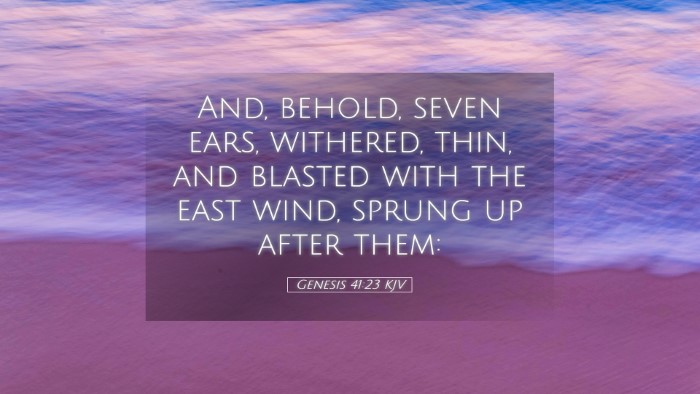Commentary on Genesis 41:23
Genesis 41:23 states, "And, behold, seven thin ears and blasted with the east wind sprung up after them." This verse occurs in the context of Joseph’s interpretation of Pharaoh’s dreams, which illustrates God's control over nations and His sovereign will.
Context of the Passage
The broader narrative of Genesis 41 details the dreams of Pharaoh, who is troubled by visions he cannot understand. In these dreams, he sees seven healthy cows consumed by seven gaunt ones, and seven well-formed ears of corn devoured by seven thin ears. Joseph is called to interpret these dreams, revealing a famine that would follow seven years of abundance.
The Symbolism of the Ears of Corn
The imagery of the ears of corn, particularly highlighted in verse 23, symbolizes both divine revelation and the impending judgment of God.
-
Thin Ears: The thin ears of corn represent scarcity and lack. This reflects the impending drought and famine, serving as a warning to Pharaoh and the Egyptian people.
-
East Wind: Adam Clarke notes that the east wind was often associated with desolation and dryness, further emphasizing the severity of the famine to come.
Interpretations by Commentators
Various biblical scholars provide valuable insights into the implications of this verse:
Matthew Henry’s Commentary
Henry emphasizes God’s governance in the affairs of men, demonstrating that these events are not mere coincidences. He illustrates that the dreams signify the dual nature of wealth and poverty, highlighting the divine orchestration behind both prosperity and adversity.
Albert Barnes’ Notes
Barnes elaborates on the idea that the thin ears symbolize the ultimate result of sin and disobedience. He notes that the devouring of the fat by the lean represents how trials can consume the fruits of prosperity, leading believers to a deeper faith and reliance on God’s provision.
Adam Clarke’s Insights
Clarke points out the significance of the "east wind" in ancient Near Eastern culture, often leading to severe drought. He highlights how this illustrates the concept of divine judgment and the necessity of heeding God’s warnings. Clarke also connects the physical famine to a spiritual deficiency, urging believers to be grounded in faith during times of scarcity.
Theological Implications
The implications of Genesis 41:23 extend beyond the historical narrative. They offer significant theological insights for pastors, students, and scholars:
-
God’s Sovereignty: This passage affirms the sovereignty of God in governing both nature and human affairs, reminding readers that He orchestrates events for His glory and the ultimate good of His people.
-
Preparation for Trials: The interpretation of the dreams serves as a reminder of God’s forewarning and the provision for preparation in times of prosperity to endure future trials.
-
Spiritual Interpretation: Believers are encouraged to attend to not only physical needs but also spiritual nourishment, as the “thin ears” can signify a famine of spiritual truths in a community.
-
Hope Amidst Judgment: Even in the revelation of impending judgment, there is hope for redemption, as Joseph’s rise to power ultimately leads to salvation for many during the famine.
-
Lessons on Leadership: The necessity for wise leadership is highlighted, showcasing Joseph as a prototype of a leader who relies on divine wisdom to guide a nation through crisis.
-
Call to Faith: This passage serves as an encouragement for believers to trust in God’s provision, even amidst uncertainty and impending trials.
-
Metaphor of Abundance and Scarcity: The contrast between abundance and scarcity in the verse invites reflection on personal and communal dependence on God as the ultimate provider.
-
Divine Communication: God speaks to His people in various ways, and Joseph’s ability to interpret dreams reminds us of the importance of spiritual discernment and understanding God’s voice.
-
Community Resilience: The narrative encourages a collective response to impending crises, suggesting that communities ought to prepare and collaborate to face future challenges together.
-
Role of Prophetic Insight: The significance of Joseph’s prophetic insights highlights the role of prophecy in guiding individuals and communities toward God’s intended outcomes.
-
Covenantal Promises: Underlying the severity of famine is the reminder of God’s covenantal promises, assuring that He will ultimately preserve His people.
-
Scriptural Reflection: Pastoral and theological reflection on this verse urges engagement with Scripture’s broader narrative concerning God’s faithfulness amidst human depravity.
-
Character Formation: The experiences faced by Joseph and the Egyptians serve as an example of how challenges can shape character and strengthen resolve in faith.
-
Redemption through Adversity: Finally, the celebration of God’s redemptive activities in the midst of adversity should encourage believers to be agents of hope and restoration in their own contexts.
Conclusion
Genesis 41:23 encapsulates the tension between abundance and scarcity while reinforcing the theological truth of God’s sovereign hand at work in every circumstance. As believers reflect on this verse, they are called to prepare faithfully for the trials of life, trust in God's provision, and exhibit leadership characterized by wisdom and discernment.


